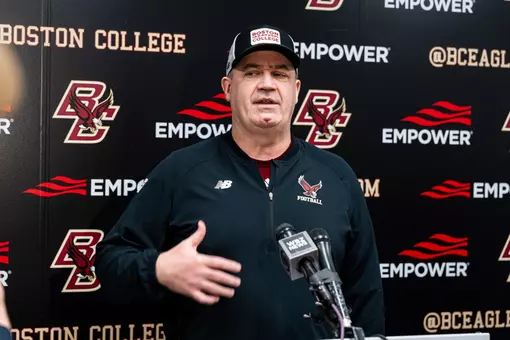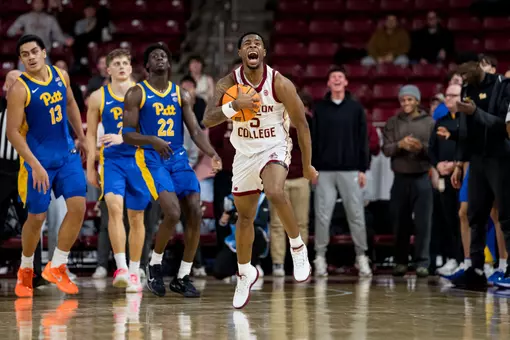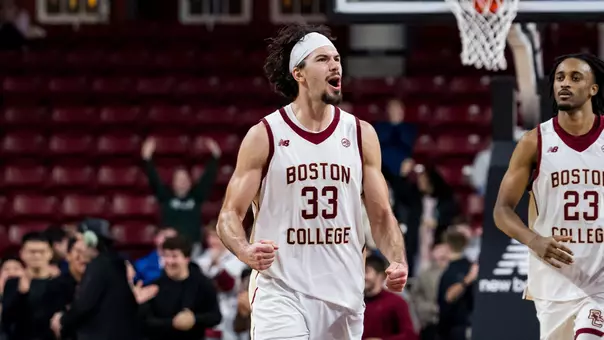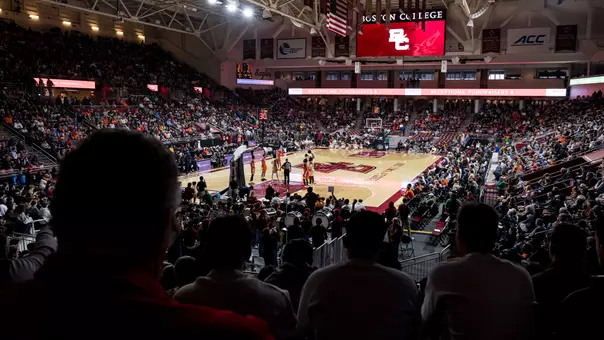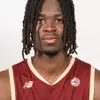Boston College Athletics
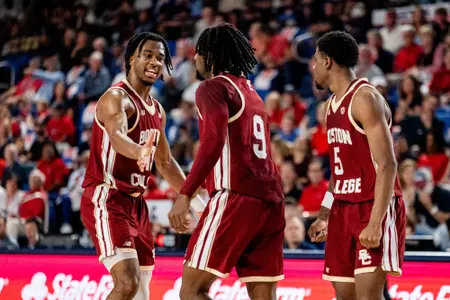
Photo by: Joe Sullivan
The Opening Tip: The Citadel
November 06, 2025 | Men's Basketball, #ForBoston Files
Conte Forum opens its doors to the hardwood for the first time in 2025-2026.
Boston College entered Monday night's overtime loss to Florida Atlantic with the weighty expectations of a first game matchup against one of college basketball's legitimate mid-major powers. The Owls were a part of the American Athletic Conference that represents the higher versions of the non-Power Four conferences, and a win over an Atlantic Coast Conference team entrenched their reputation as one of the sport's preeminent giant killers. Even before the game, the analytics crowd and evaluative realm saw the teams on an even battlefield, and the scoreboards clattered towards near-perfect predictions of a game split between programs aligned within the various algorithm-based rankings.
The result won't define either team's season, but it provided additional backdrop to the first day of a sport teeming with good basketball programs. Though FAU's win constituted an anomaly compared to other results between leagues or teams residing on a lower plane than a more powerful conference, BC was hardly the only team dealing with the team-based success that sprouted onto the national radar.
At Winthrop, for example, a program with 11 national tournament appearances since 1999 nearly lost to a Queens University squad that was in Division II until the start of the 2022-2023 season while an HBCU in Bethune-Cookman rode No. 20 Auburn to overtime before losing by five points. Fairfield's road trip to Penn State nearly ended with the Nittany Lions losing to a MAAC team that lost 20 games last year, and the local rivalry between Holy Cross and Providence ended with the Friars winning by 10 after the Crusaders scored 52 points in the second half.
Results were across the spectrum across the nation, but a long season requires a bit more settlement before reputations are fully entrenched or developed. Rounding back to BC, Thursday night's home opening game against The Citadel therefore offers a bit of refreshment to an Eagle team still seeking its first win of the season at a time when home games - and home wins - are often the difference between a team's boat taking on water or finding a way to get its motor puttering in the right direction.
"This was the first game that we played this year," said head coach Earl Grant in his postgame remarks. "We can't really look in the rearview mirror much at all, and I'm looking forward to getting back to work. We play on Thursday, so getting back to work, getting back to Boston to try and figure out how we can correct some of the mistakes that we made."
Both of The Citadel's two previous games against Boston College produced hard-fought battles with final differentials under the 10-point margin. Neither year's team finished above .500 after starting with a couple of wins over notable local competition, but each game against the Eagles left the Bulldogs with a decent idea of their season-long deficiencies. The 2023-2024 team, for example, struggled to produce steals and stops against a BC team that shot 53 percent, a sign of things to come for a team that ranked No. 329 nationally against an opponent's two-point field goal percentage. One year later, the eight steals and five blocks against BC - while appearing like high numbers at a first glance - below the season-long average that again rated near the bottom of the Division I ratings.
BC, in contrast, largely played well against FAU before struggling to close out of its second half lead. Nearly every metric ranked highly at both ends of the floor, and most significant contributors produced numbers near the top of the first two days. Even Donald Hand Jr.'s uncharacteristic struggles at the free throw line were mitigated by a solid percentage of points produced by possession, and he led a team that shot well north of an average percentage despite its noted issue in the final minutes.
"We were down six and then went up six," said Grant, "and in that six-minute stretch, I thought we played very unselfishly. We were getting stops. We have to do that for longer periods of time, but we showed that we could do it for eight minutes in a hostile environment. And on the first game of the year, I thought there were a lot of positives that have to go back and try to clean things up to get ready for the next one."
****
The Citadel Storylines (George Patton Edition)
A good plan violently executed now is better than a perfect plan executed next week.
Patton's approach to a battlefield is a favorite parallel to my personal approach to the basketball court since I've long believed that aggressive attacks overwhelm a perfect gameplan that's not executed properly or with a sense of urgency. A bad game plan is destined to fail under any circumstances, but a good plan can highlight its positives if a team remains committed to the core values that outgain or outrun its negatives.
This doesn't mean that BC needs to run Mike D'Antoni's spring-based offense to potentially gain a foothold against The Citadel. Nor does it mean that the defense needs to press with the regularity of the teams driving the two percent increase in full court defense at the professional level. Instead, it's better to commit to attacking the right areas and forcing players into uncomfortable spots is more likely at either end of the floor.
From a more granular perspective, that also translates to a slower pace and very different tempo on Thursday night. Based on last year's numbers, The Citadel was slower than Monday night's FAU roster, but the lack of tempo was also born out of a necessity to mitigate a lower field goal percentage. From a more modern perspective, the Bulldogs followed a trend of volume three-point shooting that piled more of its 66 points per game by lower percentage outside shots, so there's an awareness that a slower pace is capable of keeping the score closer against a BC team still trending towards more inside shots.
"We work on the press attack," said Grant, "and we got in a situation where [we were trapped in our backcourt against FAU]. We talk about it [every day], and if we get in that situation again, I think we have to try to do a better job of executing. Maybe I could call time out; we had one left [against the Owls] and a minute left in the game, I didn't and we lost the game."
Take calculated risks. That is quite different from being rash.
Pressing The Citadel requires BC to identify which players are more likely to touch the basketball in a half-court offense built around the outside shot. Six-foot, five-inch swing guard Keynan Davis, for example, went 2-for-6 during the season-opening win over Division II's Erskine College, but Christian Moore offered better effectiveness by going 3-for-7 on the outside shot. Eze Wali was even better than both of them after hitting half of his threes, so balancing which player to attack in possession requires vision and communication from a defense that is better when it has time to establish its set pieces.
"We're scrappy and deep," said Grant after the FAU game. "I'm glad that we have the guys that we have, and we'll watch the film to learn from it and get into the gym [to improve]."
There were stretches during Tuesday night's game that oozed optimism after BC inherently neutralized the height advantage from FAU's frontcourt. On a team where the two leading scorers were both over a plus-10 rating, seven footer Devin Williams didn't shoot particularly well in high efficiency spots and failed to generate the rebound numbers of a smaller and more agile Devin Vanterpool. He additionally found himself sandbagged by two turnovers and a foul during his 11 first half minutes.
He'd have seen more opportunities if FAU found ways to slow down its half court offense, but The Citadel is in a situation that's essentially the polar opposite: nobody taller than six-feet, nine-inches played crunch minutes for the Bulldogs, and six-foot, ten-inch Logan Menefee is an eight-minute reserve in his second career college basketball game.
While that means The Citadel is forced to keep the rock on the perimeter, it also means that BC can use its own size to explode out of a defensive posture when they start bodying ball handlers in the midrange or outside position.
Don't tell people how to do things, tell them what to do and let them surprise you with their results.
Chase Forte's arrival from South Dakota added a legitimate defensive stopper to a lineup already constructed around back-end posture, but his ability to dish the ball from a point guard position was a delightful development to the FAU game on Tuesday night. Even before the game, expectations around the point guard position remained murky if Luka Toews wasn't a starting option, but the flip-flop between Forte and Fred Payne very clearly paid dividends for a dribble-drive offense that found options outside of the paint.
Both led the team in assists in each half while finishing with a combined 11 helpers, but Forte's overall switch between point guard handler and shooting guard…well, shooter… was a big part of BC's offensive success. On multiple occasions, how Forte and Payne attacked the paint forced the Owls to collapse their defense before either player rose to the rim, but the blindside kickouts to shooters near the perimeter resulted in multiple midrange or play continuations as the formation broke down.
"We were without Luka," said Grant, "and since he's one of the three guys that plays the point, I thought Fred and Chase had to do a really good job of going back and forth at the point guard. They did a good job. We had a few bad turnovers late, and I wish we didn't have those, but that's how the game goes sometimes."
In the moment, it's easy to forget how neither player handled the point guard position on their respective teams in 2024-2025, but their continued development as ball handlers is bound to open more opportunities for Boden Kapke and Jayden Hastings as long as the bigger options can either drive the lane on their own or pull up and spot up for some face-up shots.
*****
Question Box
Can Boden Kapke establish himself as the team's second option?
DJ Hand finished Monday night's game with 20 points on 6-of-18 shooting, but his seven rebounds were second to Kapke, who went for a second-high 17 points with eight boards, including five on the offensive end. Born from a need to attack the paint with at least one legitimate big on the floor, his improved footwork opened his swings both into and out of the paint.
More importantly, he gave BC a legitimate big threat at a time when Jayden Hastings and Aidan Shaw offered more rebounding than scoring. From a rotational standpoint, not having Toews likely drew more attention to smaller players - namely the guards - who attacked the paint, but understanding Kapke's range at a time when a shorter player is more likely to play the center position as a power forward is a callback to the times that a power forward patrolled the paint during Quinten Post's tenure. As the center crept out towards a face-up shot area, his ability to knock down those points allowed the forwards to play freer at the backboard.
Does the rotation shrink on the home court?
Earl Grant sent 10 players onto the floor at various points of the FAU game, but he rode hotter hands for longer second half minutes. Marko Radunovic, for example, was a plus-15 in his 11 minutes during BC's second half comeback, but Kany Tchanda and Caleb Steger were among the first options off of the bench in the first half.
Feeling out rotations is a big part of every team's early games, and The Citadel likewise enters Thursday night with 11 players that saw at least 10 minutes in the win over Erskine. In both instances, the ideas behind the rotations likely changed, but the push forward and the "real tape" from playing a game against a "real opponent" is where coaches make the determination to either increase or decrease minutes based on a player's performance.
Individual matchups sincerely matter, as does the feel that Grant talked about as part of his preseason press conference. Then again, numbers also matter, so how it all gets cooked together is going to play out on Thursday night.
Can I make halftime before I fall asleep?
I had a couple of overnight shifts at the beginning of the week, so I entered Tuesday's daylight hours with approximately seven combined hours of sleep across Saturday, Sunday and Monday nights. Having been through two newborn phases apparently didn't help me much, either, because I fell asleep on the couch for three separate naptimes before a fourth nap on the couch led me right to bed in the eight o'clock hour.
It was a level of tiredness that I don't think I'd ever known. I've done overnight shifts before, but I was younger and able to manage the lack of sleep through later bedtimes and a reset of my circadian rhythm. This time around, having two kids made it more difficult than I imagined, and trying to balance a need for a nap against the need to be a father was equal parts daunting and disastrous. I'm pretty sure I took a nap without even knowing it, which is apparently called "microsleep."
My body is still sincerely messed up, so I'm hoping that a couple of resets over Tuesday night and Wednesday night prevent me from getting sick on Thursday. If not, then I guess it's onto the couch for a basketball game for the first time this season.
*****
BC-The Citadel X Factor
If you want it, you've got to give it. -Lenny Wilkens
There were always a few basketball statistics that bothered me over the years. I was never thrilled that Kareem Abdul-Jabbar, for example, led the NBA in all-time points scored when he didn't hold of the 20 best per-game averages, and it always nagged at me that Wilkens was the all-time regular season wins holder when the bulk of his career coached teams that inherently annoyed me. The late-70s Seattle Supersonics, for example, were champions during an era that I considered a lowpoint in NBA history, and the mid-90s Atlanta Hawks were always a middle seed during an era more crisply defined by Chicago, New York, Indiana and Orlando.
That said, I likely just had a soft spot for Don Nelson because he played for the Boston Celtics.
Anyways, there was something to be said for how his teams achieved levels of consistency. Those Seattle teams advanced to both the NBA Finals and the conference finals in the years flanking the NBA championship, and they routinely finished second or third in a Pacific Division with the Los Angeles Lakers and the Phoenix Suns. His teams in Cleveland and Atlanta contended with the Bad Boys and the Bulls and still made the playoffs, and I'm not sure anyone could have helped the Knicks in his final year-plus in the NBA.
BC's performance against Florida Atlantic was remarkably consistent within the constraints of a full 40-minute game, but the early game deficit and late-game unraveling with a five-point lead in the last minute stuck out like a sore thumb. On Thursday night, the scoreboard runs need to reflect a more consistent lead or performance against an opponent, which ultimately means that the Eagles need to hit and miss their percentages within a certain acceptable rate.
*****
Scoreboard Watching
College basketball roared back into our lives on Tuesday night with a full slate of games that ranged from the unbelievable to the truly amazing. In addition to the ones mentioned above, a day that began with morning tip-offs in the Field of 68 Basketball Marathon ended with Hawaii Pacific's one-point upset win over Boise State, a team that played Boston College in last year's multi-team holiday tournament.
Among opponents on the BC schedule, The Citadel cruised past Erskine with a 105-61 win, a result echoed by Central Connecticut's 117-55 win over Vermont State - Johnson. Hampton dropped a close result to Milwaukee, but losses absorbed by Fairleigh Dickinson, UMass and New Haven added blemishes to the teams awaiting games against the ACC's Massachusetts installation.
On a more national level, No. 6 Duke defeated Texas in a win that will almost assuredly help the ACC's non-conference resume, and Stanford avoided an upset at the hands of Portland State with an 89-79 win on the west coast. They joined the slew of positive results from Tuesday night that only narrowly included Georgia Tech's close shave against Maryland Eastern Shore.
Beyond BC's home opener, a few fun matchups dot Thursday night's continuation of college basketball's first week. In one of those matchups that can only happen in a 300-team sport, Merrimack heads to Auburn to play the No. 20 Tigers while a couple of intriguing unheralded matchups dot the games at Ohio (against Illinois State) and Abilene Christian (against Nebraska-Omaha). On a personal level, I'm mostly intrigued with the later start at SMU because Texas A&M-Corpus Christi gave New Mexico State an absolute fit during last year's trip to Las Cruces.
*****
This Random Day In History
Former vice president Walter Mondale led President Ronald Reagan in polling acquired during the 1982 midterm election cycle. His boss - President Jimmy Carter - had lost to Reagan two years earlier after the sagging economy combined with loss of American stature throughout the international community in the late 1970s, but Mondale, albeit not the formal nominee until the presidential election cycle in 1984, continued to jostle with Reagan through the autumn months in 1983.
Unfortunately for Mondale, that was about as good as it got. Reagan's surging economy brought him unprecedented success during the summer of 1984, and after Mondale enjoyed a post-convention bump in July, the incumbent president romped to one of the largest landslides in American electoral history when voters hit the polling booths on November 6.
Thursday night marks the 41st anniversary of the night that Reagan put the entire country in his cabinet. He won the second-largest share of Electoral College votes after James Monroe clinched a near-unanimous win in 1820, and he won more electoral votes than any other president. His lone losses in Minnesota and the District of Columbia prevented him from claiming all 51 electoral regions, and it remains, to date, the last time that Massachusetts voted for a Republican presidential candidate. Even in Minnesota, Mondale's win was by 3,700 votes and less than 0.25 percent - a clear sign of the dominance.
This isn't a political statement by any means because I wasn't even born for this election - despite my gray hair saying otherwise - and I don't remember a presidential election before 1996. As a fan of geography and American history, though, I always marvel at how an entire country's voting bloc can turn into the days when baseball Hall of Famers can't unanimously vote Ken Griffey Jr. into Cooperstown. Or the time that Pedro Martinez lost the MVP award because a New York writer stubbornly refused to vote for a pitcher.
*****
Pregame Quote and Final Thoughts
When all is said and done, the real citadel of strength of any community is in the hearts and minds and desires of those who dwell there. -Everett Dirksen
The first game at Florida Atlantic felt like the kind of one-off experience expected for teams planning their trips to the postseason. Returning home to play The Citadel in the first home game of the year is altogether different. For the first time, it's a chance to create an environment at Conte Forum against an opponent that plays an emerging style. For the Bulldogs, the opportunity to punch with an ACC opponent for a third straight year is enough for them to erase the memories of the previous two losses, while the Eagles need to push themselves in the right direction with a victory over a team that's likely better than its previous record indicated.
In any event, college basketball is finally returning to Boston, and with it comes the enjoyment of debate surrounding expectations.
Boston College and The Citadel will tip-off at 7 p.m. on Thursday night from Conte Forum in Chestnut Hill, Massachusetts. Television coverage is slotted for the ACC Network Extra streaming service, although YouTubeTV customers are currently experiencing issues related to the carrier dispute. For subscribers with access to the ACC Network, streaming is available only through ESPN's direct-to-consumer app platform for Internet and mobile devices. For viewers without access to the network, radio broadcast is available on WEEI 850 AM and mobile device apps where the channel is available.
The result won't define either team's season, but it provided additional backdrop to the first day of a sport teeming with good basketball programs. Though FAU's win constituted an anomaly compared to other results between leagues or teams residing on a lower plane than a more powerful conference, BC was hardly the only team dealing with the team-based success that sprouted onto the national radar.
At Winthrop, for example, a program with 11 national tournament appearances since 1999 nearly lost to a Queens University squad that was in Division II until the start of the 2022-2023 season while an HBCU in Bethune-Cookman rode No. 20 Auburn to overtime before losing by five points. Fairfield's road trip to Penn State nearly ended with the Nittany Lions losing to a MAAC team that lost 20 games last year, and the local rivalry between Holy Cross and Providence ended with the Friars winning by 10 after the Crusaders scored 52 points in the second half.
Results were across the spectrum across the nation, but a long season requires a bit more settlement before reputations are fully entrenched or developed. Rounding back to BC, Thursday night's home opening game against The Citadel therefore offers a bit of refreshment to an Eagle team still seeking its first win of the season at a time when home games - and home wins - are often the difference between a team's boat taking on water or finding a way to get its motor puttering in the right direction.
"This was the first game that we played this year," said head coach Earl Grant in his postgame remarks. "We can't really look in the rearview mirror much at all, and I'm looking forward to getting back to work. We play on Thursday, so getting back to work, getting back to Boston to try and figure out how we can correct some of the mistakes that we made."
Both of The Citadel's two previous games against Boston College produced hard-fought battles with final differentials under the 10-point margin. Neither year's team finished above .500 after starting with a couple of wins over notable local competition, but each game against the Eagles left the Bulldogs with a decent idea of their season-long deficiencies. The 2023-2024 team, for example, struggled to produce steals and stops against a BC team that shot 53 percent, a sign of things to come for a team that ranked No. 329 nationally against an opponent's two-point field goal percentage. One year later, the eight steals and five blocks against BC - while appearing like high numbers at a first glance - below the season-long average that again rated near the bottom of the Division I ratings.
BC, in contrast, largely played well against FAU before struggling to close out of its second half lead. Nearly every metric ranked highly at both ends of the floor, and most significant contributors produced numbers near the top of the first two days. Even Donald Hand Jr.'s uncharacteristic struggles at the free throw line were mitigated by a solid percentage of points produced by possession, and he led a team that shot well north of an average percentage despite its noted issue in the final minutes.
"We were down six and then went up six," said Grant, "and in that six-minute stretch, I thought we played very unselfishly. We were getting stops. We have to do that for longer periods of time, but we showed that we could do it for eight minutes in a hostile environment. And on the first game of the year, I thought there were a lot of positives that have to go back and try to clean things up to get ready for the next one."
****
The Citadel Storylines (George Patton Edition)
A good plan violently executed now is better than a perfect plan executed next week.
Patton's approach to a battlefield is a favorite parallel to my personal approach to the basketball court since I've long believed that aggressive attacks overwhelm a perfect gameplan that's not executed properly or with a sense of urgency. A bad game plan is destined to fail under any circumstances, but a good plan can highlight its positives if a team remains committed to the core values that outgain or outrun its negatives.
This doesn't mean that BC needs to run Mike D'Antoni's spring-based offense to potentially gain a foothold against The Citadel. Nor does it mean that the defense needs to press with the regularity of the teams driving the two percent increase in full court defense at the professional level. Instead, it's better to commit to attacking the right areas and forcing players into uncomfortable spots is more likely at either end of the floor.
From a more granular perspective, that also translates to a slower pace and very different tempo on Thursday night. Based on last year's numbers, The Citadel was slower than Monday night's FAU roster, but the lack of tempo was also born out of a necessity to mitigate a lower field goal percentage. From a more modern perspective, the Bulldogs followed a trend of volume three-point shooting that piled more of its 66 points per game by lower percentage outside shots, so there's an awareness that a slower pace is capable of keeping the score closer against a BC team still trending towards more inside shots.
"We work on the press attack," said Grant, "and we got in a situation where [we were trapped in our backcourt against FAU]. We talk about it [every day], and if we get in that situation again, I think we have to try to do a better job of executing. Maybe I could call time out; we had one left [against the Owls] and a minute left in the game, I didn't and we lost the game."
Take calculated risks. That is quite different from being rash.
Pressing The Citadel requires BC to identify which players are more likely to touch the basketball in a half-court offense built around the outside shot. Six-foot, five-inch swing guard Keynan Davis, for example, went 2-for-6 during the season-opening win over Division II's Erskine College, but Christian Moore offered better effectiveness by going 3-for-7 on the outside shot. Eze Wali was even better than both of them after hitting half of his threes, so balancing which player to attack in possession requires vision and communication from a defense that is better when it has time to establish its set pieces.
"We're scrappy and deep," said Grant after the FAU game. "I'm glad that we have the guys that we have, and we'll watch the film to learn from it and get into the gym [to improve]."
There were stretches during Tuesday night's game that oozed optimism after BC inherently neutralized the height advantage from FAU's frontcourt. On a team where the two leading scorers were both over a plus-10 rating, seven footer Devin Williams didn't shoot particularly well in high efficiency spots and failed to generate the rebound numbers of a smaller and more agile Devin Vanterpool. He additionally found himself sandbagged by two turnovers and a foul during his 11 first half minutes.
He'd have seen more opportunities if FAU found ways to slow down its half court offense, but The Citadel is in a situation that's essentially the polar opposite: nobody taller than six-feet, nine-inches played crunch minutes for the Bulldogs, and six-foot, ten-inch Logan Menefee is an eight-minute reserve in his second career college basketball game.
While that means The Citadel is forced to keep the rock on the perimeter, it also means that BC can use its own size to explode out of a defensive posture when they start bodying ball handlers in the midrange or outside position.
Don't tell people how to do things, tell them what to do and let them surprise you with their results.
Chase Forte's arrival from South Dakota added a legitimate defensive stopper to a lineup already constructed around back-end posture, but his ability to dish the ball from a point guard position was a delightful development to the FAU game on Tuesday night. Even before the game, expectations around the point guard position remained murky if Luka Toews wasn't a starting option, but the flip-flop between Forte and Fred Payne very clearly paid dividends for a dribble-drive offense that found options outside of the paint.
Both led the team in assists in each half while finishing with a combined 11 helpers, but Forte's overall switch between point guard handler and shooting guard…well, shooter… was a big part of BC's offensive success. On multiple occasions, how Forte and Payne attacked the paint forced the Owls to collapse their defense before either player rose to the rim, but the blindside kickouts to shooters near the perimeter resulted in multiple midrange or play continuations as the formation broke down.
"We were without Luka," said Grant, "and since he's one of the three guys that plays the point, I thought Fred and Chase had to do a really good job of going back and forth at the point guard. They did a good job. We had a few bad turnovers late, and I wish we didn't have those, but that's how the game goes sometimes."
In the moment, it's easy to forget how neither player handled the point guard position on their respective teams in 2024-2025, but their continued development as ball handlers is bound to open more opportunities for Boden Kapke and Jayden Hastings as long as the bigger options can either drive the lane on their own or pull up and spot up for some face-up shots.
*****
Question Box
Can Boden Kapke establish himself as the team's second option?
DJ Hand finished Monday night's game with 20 points on 6-of-18 shooting, but his seven rebounds were second to Kapke, who went for a second-high 17 points with eight boards, including five on the offensive end. Born from a need to attack the paint with at least one legitimate big on the floor, his improved footwork opened his swings both into and out of the paint.
More importantly, he gave BC a legitimate big threat at a time when Jayden Hastings and Aidan Shaw offered more rebounding than scoring. From a rotational standpoint, not having Toews likely drew more attention to smaller players - namely the guards - who attacked the paint, but understanding Kapke's range at a time when a shorter player is more likely to play the center position as a power forward is a callback to the times that a power forward patrolled the paint during Quinten Post's tenure. As the center crept out towards a face-up shot area, his ability to knock down those points allowed the forwards to play freer at the backboard.
Does the rotation shrink on the home court?
Earl Grant sent 10 players onto the floor at various points of the FAU game, but he rode hotter hands for longer second half minutes. Marko Radunovic, for example, was a plus-15 in his 11 minutes during BC's second half comeback, but Kany Tchanda and Caleb Steger were among the first options off of the bench in the first half.
Feeling out rotations is a big part of every team's early games, and The Citadel likewise enters Thursday night with 11 players that saw at least 10 minutes in the win over Erskine. In both instances, the ideas behind the rotations likely changed, but the push forward and the "real tape" from playing a game against a "real opponent" is where coaches make the determination to either increase or decrease minutes based on a player's performance.
Individual matchups sincerely matter, as does the feel that Grant talked about as part of his preseason press conference. Then again, numbers also matter, so how it all gets cooked together is going to play out on Thursday night.
Can I make halftime before I fall asleep?
I had a couple of overnight shifts at the beginning of the week, so I entered Tuesday's daylight hours with approximately seven combined hours of sleep across Saturday, Sunday and Monday nights. Having been through two newborn phases apparently didn't help me much, either, because I fell asleep on the couch for three separate naptimes before a fourth nap on the couch led me right to bed in the eight o'clock hour.
It was a level of tiredness that I don't think I'd ever known. I've done overnight shifts before, but I was younger and able to manage the lack of sleep through later bedtimes and a reset of my circadian rhythm. This time around, having two kids made it more difficult than I imagined, and trying to balance a need for a nap against the need to be a father was equal parts daunting and disastrous. I'm pretty sure I took a nap without even knowing it, which is apparently called "microsleep."
My body is still sincerely messed up, so I'm hoping that a couple of resets over Tuesday night and Wednesday night prevent me from getting sick on Thursday. If not, then I guess it's onto the couch for a basketball game for the first time this season.
*****
BC-The Citadel X Factor
If you want it, you've got to give it. -Lenny Wilkens
There were always a few basketball statistics that bothered me over the years. I was never thrilled that Kareem Abdul-Jabbar, for example, led the NBA in all-time points scored when he didn't hold of the 20 best per-game averages, and it always nagged at me that Wilkens was the all-time regular season wins holder when the bulk of his career coached teams that inherently annoyed me. The late-70s Seattle Supersonics, for example, were champions during an era that I considered a lowpoint in NBA history, and the mid-90s Atlanta Hawks were always a middle seed during an era more crisply defined by Chicago, New York, Indiana and Orlando.
That said, I likely just had a soft spot for Don Nelson because he played for the Boston Celtics.
Anyways, there was something to be said for how his teams achieved levels of consistency. Those Seattle teams advanced to both the NBA Finals and the conference finals in the years flanking the NBA championship, and they routinely finished second or third in a Pacific Division with the Los Angeles Lakers and the Phoenix Suns. His teams in Cleveland and Atlanta contended with the Bad Boys and the Bulls and still made the playoffs, and I'm not sure anyone could have helped the Knicks in his final year-plus in the NBA.
BC's performance against Florida Atlantic was remarkably consistent within the constraints of a full 40-minute game, but the early game deficit and late-game unraveling with a five-point lead in the last minute stuck out like a sore thumb. On Thursday night, the scoreboard runs need to reflect a more consistent lead or performance against an opponent, which ultimately means that the Eagles need to hit and miss their percentages within a certain acceptable rate.
*****
Scoreboard Watching
College basketball roared back into our lives on Tuesday night with a full slate of games that ranged from the unbelievable to the truly amazing. In addition to the ones mentioned above, a day that began with morning tip-offs in the Field of 68 Basketball Marathon ended with Hawaii Pacific's one-point upset win over Boise State, a team that played Boston College in last year's multi-team holiday tournament.
Among opponents on the BC schedule, The Citadel cruised past Erskine with a 105-61 win, a result echoed by Central Connecticut's 117-55 win over Vermont State - Johnson. Hampton dropped a close result to Milwaukee, but losses absorbed by Fairleigh Dickinson, UMass and New Haven added blemishes to the teams awaiting games against the ACC's Massachusetts installation.
On a more national level, No. 6 Duke defeated Texas in a win that will almost assuredly help the ACC's non-conference resume, and Stanford avoided an upset at the hands of Portland State with an 89-79 win on the west coast. They joined the slew of positive results from Tuesday night that only narrowly included Georgia Tech's close shave against Maryland Eastern Shore.
Beyond BC's home opener, a few fun matchups dot Thursday night's continuation of college basketball's first week. In one of those matchups that can only happen in a 300-team sport, Merrimack heads to Auburn to play the No. 20 Tigers while a couple of intriguing unheralded matchups dot the games at Ohio (against Illinois State) and Abilene Christian (against Nebraska-Omaha). On a personal level, I'm mostly intrigued with the later start at SMU because Texas A&M-Corpus Christi gave New Mexico State an absolute fit during last year's trip to Las Cruces.
*****
This Random Day In History
Former vice president Walter Mondale led President Ronald Reagan in polling acquired during the 1982 midterm election cycle. His boss - President Jimmy Carter - had lost to Reagan two years earlier after the sagging economy combined with loss of American stature throughout the international community in the late 1970s, but Mondale, albeit not the formal nominee until the presidential election cycle in 1984, continued to jostle with Reagan through the autumn months in 1983.
Unfortunately for Mondale, that was about as good as it got. Reagan's surging economy brought him unprecedented success during the summer of 1984, and after Mondale enjoyed a post-convention bump in July, the incumbent president romped to one of the largest landslides in American electoral history when voters hit the polling booths on November 6.
Thursday night marks the 41st anniversary of the night that Reagan put the entire country in his cabinet. He won the second-largest share of Electoral College votes after James Monroe clinched a near-unanimous win in 1820, and he won more electoral votes than any other president. His lone losses in Minnesota and the District of Columbia prevented him from claiming all 51 electoral regions, and it remains, to date, the last time that Massachusetts voted for a Republican presidential candidate. Even in Minnesota, Mondale's win was by 3,700 votes and less than 0.25 percent - a clear sign of the dominance.
This isn't a political statement by any means because I wasn't even born for this election - despite my gray hair saying otherwise - and I don't remember a presidential election before 1996. As a fan of geography and American history, though, I always marvel at how an entire country's voting bloc can turn into the days when baseball Hall of Famers can't unanimously vote Ken Griffey Jr. into Cooperstown. Or the time that Pedro Martinez lost the MVP award because a New York writer stubbornly refused to vote for a pitcher.
*****
Pregame Quote and Final Thoughts
When all is said and done, the real citadel of strength of any community is in the hearts and minds and desires of those who dwell there. -Everett Dirksen
The first game at Florida Atlantic felt like the kind of one-off experience expected for teams planning their trips to the postseason. Returning home to play The Citadel in the first home game of the year is altogether different. For the first time, it's a chance to create an environment at Conte Forum against an opponent that plays an emerging style. For the Bulldogs, the opportunity to punch with an ACC opponent for a third straight year is enough for them to erase the memories of the previous two losses, while the Eagles need to push themselves in the right direction with a victory over a team that's likely better than its previous record indicated.
In any event, college basketball is finally returning to Boston, and with it comes the enjoyment of debate surrounding expectations.
Boston College and The Citadel will tip-off at 7 p.m. on Thursday night from Conte Forum in Chestnut Hill, Massachusetts. Television coverage is slotted for the ACC Network Extra streaming service, although YouTubeTV customers are currently experiencing issues related to the carrier dispute. For subscribers with access to the ACC Network, streaming is available only through ESPN's direct-to-consumer app platform for Internet and mobile devices. For viewers without access to the network, radio broadcast is available on WEEI 850 AM and mobile device apps where the channel is available.
Players Mentioned
Men's Basketball: Pittsburgh Postgame Press Conference (Jan. 21, 2026)
Thursday, January 22
Football: Offseason Sit-Down with Head Coach Bill O'Brien
Wednesday, January 21
Football: Head Coach Bill O'Brien Media Availability (January 20, 2026)
Tuesday, January 20
BC Women's Hockey All-Access
Tuesday, January 20

